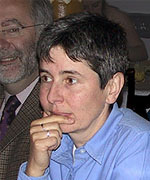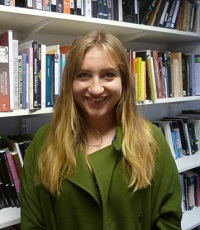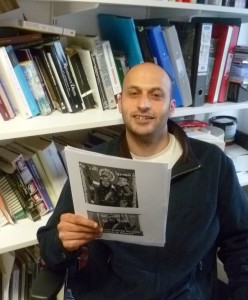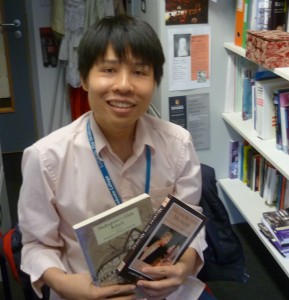Professor Emeritus Meg Twycross
 Professor Emeritus Meg Twycross is a world-wide authority on medieval English theatre who continues to research from within the Department. In March 2001 she was presented with a festschrift in her honour entitled Porci ante Margaritam. She specialises in Medieval and Early Tudor theatre and festival, medieval iconography, encounters with the Other World. She is co-editor of the journal Medieval English Theatre and its associated publications and co-author, with Professor Sarah Carpenter of Edinburgh University, of Masks and Masking in Medieval and Early Tudor England (2002). Her research on medieval iconography and on the meticulous recreation of medieval performance conditions is also practical in nature. She organised two pageant-waggon sequences along part of the original route of the York Mystery Plays for the York festivals of 1988 and 1992. Her videos made with Lancaster University Television are used widely for teaching. She has just staged a recreation of the ‘Mumming for the Mercers of London’ at Skinner’s Hall.
Professor Emeritus Meg Twycross is a world-wide authority on medieval English theatre who continues to research from within the Department. In March 2001 she was presented with a festschrift in her honour entitled Porci ante Margaritam. She specialises in Medieval and Early Tudor theatre and festival, medieval iconography, encounters with the Other World. She is co-editor of the journal Medieval English Theatre and its associated publications and co-author, with Professor Sarah Carpenter of Edinburgh University, of Masks and Masking in Medieval and Early Tudor England (2002). Her research on medieval iconography and on the meticulous recreation of medieval performance conditions is also practical in nature. She organised two pageant-waggon sequences along part of the original route of the York Mystery Plays for the York festivals of 1988 and 1992. Her videos made with Lancaster University Television are used widely for teaching. She has just staged a recreation of the ‘Mumming for the Mercers of London’ at Skinner’s Hall.
Professor Twycross also co-directs the Early Quaker Project with Professor Hilary Hinds and Professor Alison Findlay. She has used her expertise in the applications of Humanities Computing to construct the project’s pioneering website which offers a parallel text online edition of the three versions of George Fox’s journal account of his journey through Lancashire, Westmorland and Cumberland in 1652-3. Photographs, videos, maps, biographies, and parallel Quaker writings linked to Fox’s texts demonstrate how early Quakerism emerged from and was shaped by a series of distinctive spatial and cultural networks
Professor Alison Findlay
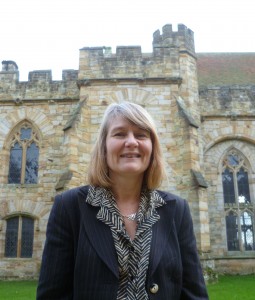 Alison’s specialist interests are in Shakespearean drama and women’s writing of the sixteenth and seventeenth centuries. She is the author of Illegitimate Power: Bastards in Renaissance Drama (1994), A Feminist Perspective on Renaissance Drama (1999), Playing Spaces in Early Women’s Drama (2006), Women in Shakespeare (2010), Much Ado About Nothing: A Guide to the Text and Play in Performance (2011) and Twlefth Night: Critical Essays co-edited with Liz Oakley-Brown for Arden. She is currently editing Narrative and Dramatic Sources to Shakespeare, Vol IX The Romances, to be published by Routledge, and co-editing Shakespeare and Greece for Arden Shakespeare. Alison is a General Editor of Revels Plays, and is working on an edition of the Penshurst Manuscript of Lady Mary Wroth’s Love’s Victory. She has published numerous essays and articles on Shakespeare and his contemporaries, and reviewed books on Shakespeare’s life, times and stage for Shakespeare Survey. She co-directs the Early Quaker Project with Professor Hilary Hinds and Professor Meg Twycross
Alison’s specialist interests are in Shakespearean drama and women’s writing of the sixteenth and seventeenth centuries. She is the author of Illegitimate Power: Bastards in Renaissance Drama (1994), A Feminist Perspective on Renaissance Drama (1999), Playing Spaces in Early Women’s Drama (2006), Women in Shakespeare (2010), Much Ado About Nothing: A Guide to the Text and Play in Performance (2011) and Twlefth Night: Critical Essays co-edited with Liz Oakley-Brown for Arden. She is currently editing Narrative and Dramatic Sources to Shakespeare, Vol IX The Romances, to be published by Routledge, and co-editing Shakespeare and Greece for Arden Shakespeare. Alison is a General Editor of Revels Plays, and is working on an edition of the Penshurst Manuscript of Lady Mary Wroth’s Love’s Victory. She has published numerous essays and articles on Shakespeare and his contemporaries, and reviewed books on Shakespeare’s life, times and stage for Shakespeare Survey. She co-directs the Early Quaker Project with Professor Hilary Hinds and Professor Meg Twycross
Professor Hilary Hinds
Hilary Hinds’ principal area of research is in early modern writing, particularly work by women from the radical sects of the second half of the seventeenth century. Her main publications in this area are God’s Englishwomen: Seventeenth-Century Radical Sectarian Writing and Feminist Criticism (Manchester University Press, 1996), an edition of the prophet Anna Trapnel’s The Cry of a Stone of 1654 (Arizona Center for Medieval and Renaissance Studies, 2000), a new edition of Anna Trapnel’s Report and Plea (1654) for the series, ‘The Other Voice in Early Modern Europe’ (forthcoming with Iter at the University of Toronto Press, 2016). Hilary is also co-editor of Her Own Life: Autobiographical Writings by Seventeenth-Century Englishwomen (Routledge, 1989, and co-director of the project ‘Quakers in North-West England and the Politics of Space, 1652-1653’ (http://www.lancaster.ac.uk/fass/projects/quakers/01_quakers_home.html). Her most recent monograph, George Fox and Early Quaker Culture (Manchester University Press, 2011), examines the cultural impact of the doctrine of the indwelling Christ on the early Quaker movement.
Dr Liz Oakley-Brown
 Liz Oakley-Brown’s main research areas are in the cultural politics of early-modern translation: embodiment; emotions; mythology; surface studies. She is working on two book-length studies which illustrate her two main research interests. Her Leverhulme-funded book project, is entitled Travel, Translation and Tudor Sensibilities: Thomas Churchyard’s Passionate History. The second book-length study Shakespearean Surfaces: Reading, Writing and Performing Superficiality in Sixteenth-Century England, grows from Liz’s interests in early modern surfaces. http://wp.lancs.ac.uk/early-modern-surfaces/ ).With Dr Rebecca Coleman (Sociology, Goldsmiths University) Liz organises The Surface Studies Network surfacestudies.org whose inaugural Surface Studies Network Seminar (Theorising Surfaces) and Exhibition (Surfaces in the Making) was held at Lancaster University and the Storey Institute, 23-24 May 2013. Since March 2014, Liz has been the co-editor of Renaissance Literature Compass http://literature-compass.com/renaissance/
Liz Oakley-Brown’s main research areas are in the cultural politics of early-modern translation: embodiment; emotions; mythology; surface studies. She is working on two book-length studies which illustrate her two main research interests. Her Leverhulme-funded book project, is entitled Travel, Translation and Tudor Sensibilities: Thomas Churchyard’s Passionate History. The second book-length study Shakespearean Surfaces: Reading, Writing and Performing Superficiality in Sixteenth-Century England, grows from Liz’s interests in early modern surfaces. http://wp.lancs.ac.uk/early-modern-surfaces/ ).With Dr Rebecca Coleman (Sociology, Goldsmiths University) Liz organises The Surface Studies Network surfacestudies.org whose inaugural Surface Studies Network Seminar (Theorising Surfaces) and Exhibition (Surfaces in the Making) was held at Lancaster University and the Storey Institute, 23-24 May 2013. Since March 2014, Liz has been the co-editor of Renaissance Literature Compass http://literature-compass.com/renaissance/
Postgraduate Students
Beth Cortese (second year PhD student
 My PhD thesis entitled ‘Pregnant Wit’ focuses on the creative and subversive nature of women’s wit in the work of female dramatists spanning the period 1660-1720, in particular, the works of Aphra Behn, Susanna Centlivre, Mary Pix, Elizabeth Polwhele, Delarivier Manley and Catharine Trotter. I am using Lancaster University’s database CQP web to track the various nuances of the term wit in relation to women.
My PhD thesis entitled ‘Pregnant Wit’ focuses on the creative and subversive nature of women’s wit in the work of female dramatists spanning the period 1660-1720, in particular, the works of Aphra Behn, Susanna Centlivre, Mary Pix, Elizabeth Polwhele, Delarivier Manley and Catharine Trotter. I am using Lancaster University’s database CQP web to track the various nuances of the term wit in relation to women.
I
Imogen Felstead (first year PhD student)
My PhD research, following a Masters by Research, is on Stage(d) Hands in Early Modern Drama using a phenomenological approach derived from the work of Marcel Merleau-Ponty
Changzhi-Hu (second year PhD student)
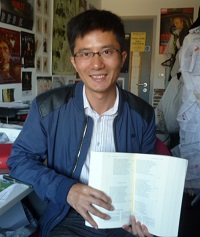 My thesis is on the work of John Donne. It explores the postmodernity of Donne’s writing in his representations of women and his dialogues with the divine. It uses a framework of Lacanian psychoanalysis alongside Derridean approaches to trace the self-conscious playfulness of Donne’s writing.
My thesis is on the work of John Donne. It explores the postmodernity of Donne’s writing in his representations of women and his dialogues with the divine. It uses a framework of Lacanian psychoanalysis alongside Derridean approaches to trace the self-conscious playfulness of Donne’s writing.
Rachel White (final year PhD student)
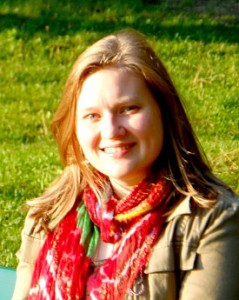 My thesis looks at occult networks and literary coteries in the late Elizabethan period. Coteries of interest include the School of Night, the Areopagus, and the Wilton-House circle. I am also interested in witchcraft and witchcraft trials of the early modern period
My thesis looks at occult networks and literary coteries in the late Elizabethan period. Coteries of interest include the School of Night, the Areopagus, and the Wilton-House circle. I am also interested in witchcraft and witchcraft trials of the early modern period
Belal Hamamra (final year PhD student)
- My thesis is a dialogue between male-and female-authored drama and the competing ideologies on speech, silence, hearing and gender they enact. I analyse the early modern plays from a contemporary Palestinian perspective, for the early modern period’s legacy of repressing and victimizing women is a projection screen for contemporary scripted narratives of Palestinian women’s oppression. I am currently undertaking revisions and have submitted an article on Webster for publication.
Rachod Nusen (final year PhD student)
I am writing a theatre history of Measure for Measure, including chapters on early Jacobean performances, ‘Elizabethanist’ reconstructions by Poel and at the new Globe, touring productions and screen versions. I am now completing corrections to my thesis following my viva in September 2015.

